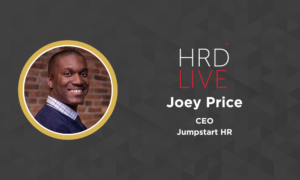Rewiring leadership with Josh Bersin
- 13 Min Read
What if we were to change the traditional way leadership was constructed, completely disrupt the status quo, and lay fresh and modern foundations for the future generations of workforces to come?
- Author: Emily Sexton-Brown
- Date published: Nov 5, 2018
- Categories

This is exactly what Josh Bersin has in mind.
Josh Bersin, the world-renowned industry analyst and founder of Bersin by Deloitte, took the time to speak with HRD Connect about the impending HR trends to be mindful of. These include why payment systems are entirely out of date and in need of serious modernisation; the core generational differences between global workforces; and the fundamental skills we will need for most future roles as we enter a new, digitally-disrupted world of work.
What have been the most innovative HR trends to emerge in 2018 so far?
2018 has represented the emergence of AI as a significant technology disruptor within HR.
“Everything in our consumer lives is making our world easier, simpler and more curated. We need the same thing to happen in the workplace.”
We’ve shifted from a world of automation systems to what I call ‘systems of productivity’, meaning that these HR tools need be as intelligent as the consumer tools that are already in existence.

Currently, 40% of Americans have access to an ‘Alexa’-type device at home and we have phones that recognise faces. Everything in our consumer lives is making our own personal lives easier, simpler and more curated. We need the same thing to happen in the workplace, which the HR technology community is beginning to figure out.
When considering the non-technology side of HR, the biggest shift is the bout of economic growth we are experiencing with very tight labour markets in many cities. Five generations are now working alongside each other. HR departments need to revitalise the employment brand, reskill and help people inside the company evolve into new roles.
Trust and social value are very important within the world of work in 2018. Employees, workers and individuals alike are all looking for a sense of trust within their institutions because they aren’t finding it within their political systems.
Businesses need to step up as trusted institutions. HR needs to foster that trust, as well as diversity, inclusion, fairness, and transparency.
What topics should HR leaders be paying very close attention to?
The first is the employee experience. The following questions embody the issues surrounding employee experience:
- Are your employees finding HR solutions productive within their flow of work?
- Are these solutions interrupting work?
- Are we making work itself easier?
- Are we nailing down and eliminating all the technology complexity in work?
- Are we integrating HR processes into the workflow, and into the systems of productivity like outlook or slack?
The second is the continual alignment of HR with the needs of the business.
One of the biggest and most common global issues executives raise is the lack of strategic vision from business partners. Does your HR department have the skills and data access for professionals to leverage workforce-related data? Are you set up to streamline and deliver HR services in an effective way?
Consider your whole talent strategy and examine how you recruit, how you develop people, and how you pay people. Are your processes aligned with the modern business market and will they support your company’s business goals?
These processes are being disrupted because of today’s flatter organisational structures, many more gig and alternative workers, and a need to manage people at different stages in their career at the same time. HR success is about optimising and innovating within these talent practices, which is why I’m writing a book on this topic.
What areas do you believe are being overlooked?
I wouldn’t say things are ‘overlooked’ – I’d be more inclined to say that some things are devilishly hard, and people don’t know how to resolve them.

An example of this could be the responsibility of building seamless experiences for employees in a world of entirely disrupted HR technology. Companies have spent a lot of money replacing on-premises systems with cloud systems because they believed that this was the answer. Yes, it integrated the data efficiently and they have fewer vendors, but now they have a very high-cost cloud-based ERP (enterprise resource planning) system. The average HR department has nine or 10 systems of records, which make data management very difficult.
HR organizations should also be helping business leaders understand why the workforce is so overwhelmed. In a recent conversation, a CHRO explained that the reason his HR team was running a wellbeing programme was because employees are exhausted. We’re in this industrial age now where we have all this technology, but the humans haven’t kept up, nor has technology adapted to the humans.
“We’re in this industrial age now where we have all this technology, but the humans haven’t kept up with the technology.”
We’re working at night; we’re working at weekends; we’re inundated with information. HR needs to play a strategic role in helping the people function grow while businesses transform. It’s easy enough to build apps or outsource a company to develop technology, but what do you do with your people? How do they interact with each other? Now that we work predominately in teams and less in hierarchies, what could that possibly mean for rewards and pay? Pay systems around the world are very outdated.
The answer to a lot of these challenges is to introduce more creativity and innovation among HR and senior leaders. Approaching leaders and asking to pilot a programme that allows employees to take an extra week of holiday, or a programme that allows employees to come to work late, or to be able to skip meetings if they don’t think they are relevant. There are dozens of ideas like these that need to adapt to the changing formula of organisations as we continue the transition into this new, digital way of working.
Can you explain why you think payment systems are outdated?
This is a really big topic.
Bersin by Deloitte carried out a study earlier this year in which we asked six or seven hundred companies a range of questions about their pay practices. The headline for me was that only 11% of these companies said that their current pay practices are directly aligned with their business strategy. The way we pay people is an institutionalised, legacy process that goes back to the industrial age. We work with salary bands and numerous rules that regulate how, what, and when people are paid. We are concerned about overpaying employees out of budget concerns, even though it costs approximately four or five times more to lose someone than it does to give them a raise.
Wages have not kept up with inflation and we’re not paying people frequently enough. People want more holistic benefits in different packages, but we haven’t done enough analysis around what really matters to people in our pay systems. Pay systems are outdated and the people who are running these systems aren’t given the power to innovate. The pay function as an administrative, compliance and a cost-cutting function, which is not what it is. Innovative pay systems and processes will huge over the next couple of years.
Do you think soft skills are going to be in equally high demand as digital skills given the ever-growing technological advances?
I think digital skills will become more of a commodity, to be honest.
For example, my brother’s son is graduating from high school. He’s bright and has learned how to code in high school. In fact, he’s developed video games in high school. He’ll be entering college next year with pretty sophisticated digital skills.
People are learning these skills at younger and younger ages – it’s digital fluency. Therefore, the younger workforce is digitally ready. The core issue that more companies are facing is finding the right skills to build team collaboration and social skills. It personally took me about 15 years to learn all these soft skills in business.
A recent study by Bloomberg and Workday surveyed 300 to 400 executives about the skills they were seeing in recently hired graduates. Almost two thirds of respondents said that they weren’t finding the right kind of soft skills needed. The core finding was that people are failing to understand complex problems, and they don’t understand how to work on large projects within teams. They’ve been academically trained, but that’s not enough.
I’m currently advising a very interesting software company that has been looking at the SATs (a standardised test that strongly factors into the college admission process in the United States). The SATs is mostly a cognitive and intelligence test, not a problem-solving test. This company believes that they can change the way we assess people before entering college, ensuring that universities and colleges give students more experience in these social skills.
I think most academics know this, but we don’t have a system that promotes developing these kinds of skills for early in life. For instance, what if a new employee spent the first year of his or her working life in a boot camp focused on how to work for that specific company, how to work in a team, how to work on projects, and how to communicate and how to sell?
“We need to accept the fact that managers are not just task managers anymore – they are coaches.”
Those soft skills are so important. If you look at the future of work research that’s been carried out by McKinsey and Deloitte you’ll notice that routine and technical jobs are becoming automated. Coding is also becoming increasingly automated. It’s the way you interact with people that is not being automated: serving, selling, communication, and empathy.
Next is mentorship. We need to accept the fact that managers are not just task managers anymore – they are coaches. People who are promoted into management should be promoted not just because of their technical expertise, but because of their ability to coach and develop and support other people. These should be skills on anyone’s leadership list, but they are not always the qualities that are respected or valued.
What do you anticipate being the core skills needed for future roles?
One of the most critical skills will be pattern matching. We’ve got fake news and bizarre postings on YouTube and Facebook and other social sites. Everywhere you go there is too much information. We as human beings must figure out how to look at the patterns and filter the noise.
Consider this at work – what’s important and what’s not? What has a customer said and what can I really do to help them? These are skills that communicate empathy. We need employees with the ability to filter information, to analyse, and then use solid human judgment.
“We as human beings must figure out how to look at the patterns and filter the noise.”
Another core skill needed is design and creativity. I went through years of college studying maths science, physics and accounting, but I didn’t do design at all. I developed my own design skills later in life when I was running my own company. We are finding that more and more of the solutions in HR and other departments are based on design thinking. Rather than automatically applying some type of standardised template, teams examine a problem and then think creatively about how to solve it. Companies need people who think differently and who can design solutions.
Are there any other departments that HR should be learning from?
We wrote an article in the Deloitte Capital Trends report last year called ‘The Symphonic C-Suite.’ We found that the number one challenge around the world was that C-suite executives did not work in concert. Three-quarters of those surveyed said C-level executives did not spend enough time together. The VP of HR focuses on HR matters, the CIO focuses entirely on IT problems, the CFO focused on numbers — and no one really talks to each other. That is a significant failure.
In the case of HR, there is absolutely no way to be effective without being interwoven with other business functions. You need IT to build the digital employee experience; you need to work with sales and other operations to ensure that people are being trained; you need to work with the CEO on issues such as culture, social missions, values and trust; you need to work with the CFO on the workforce plan.
Another huge issue in companies right now is determining a workforce plan for a world where skilled labor is tight and the number of gig and alternative workers are growing. How are we going to budget for headcount? How do we account for internal mobility, as opposed to external mobility? Should we be doing more gig work?
“Looking at a problem and not just applying a template that everyone else has done before but thinking creatively about how to solve it.”
I spoke with a very senior CHRO in an auto company who predicted a shortage of 50,000 mechanical engineers in the next three to five years. He will now need to work with the CFO and devise whether they are going to build a corporate university or consider an engineering team elsewhere.
These relationships are critical for senior HR people. In terms or marketing, the product brand of the company is interlocked with the employee brand. Many of the employer brand and campaign management issues that occur in HR are marketing issues. Therefore, that relationship must be really strong. All those relationships are unique and need to be established.
What advice would you give to HR professionals who are part of the aging workforce struggling with the pressures and demands of new technology, and do you think this is an area in which leaders need to invest in training?
The aging workforce can be viewed as a problem or an opportunity.
In most countries, the boomers are living longer, and their careers are longer. We struggle to assess and analyse the career model for those in their 50s, 60s, 70s and 80s. At that stage in one’s career, you’re unlikely to become the CEO, and you may not even want a promotion. However, such an employee could be a valuable mentor. How do you compensate these employees and effectively utilise them?
Given today’s talent shortage, it’s a big opportunity for HR departments to figure out how to leverage this segment of the workforce and how to combat inherent age discrimination.
In companies that have workforces comprised of multiple generations, employees are more engaged. Employees have the benefit of mentorship and coaching, and older workers gain fresh insights and perspectives from younger co-workers.









